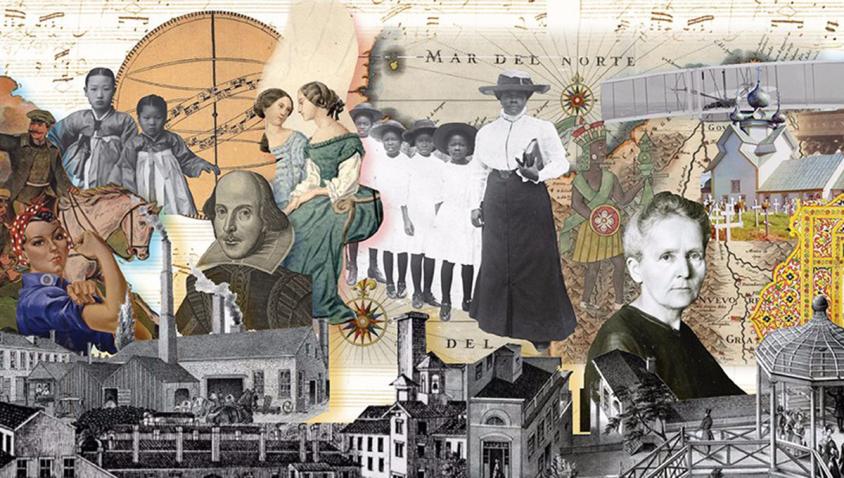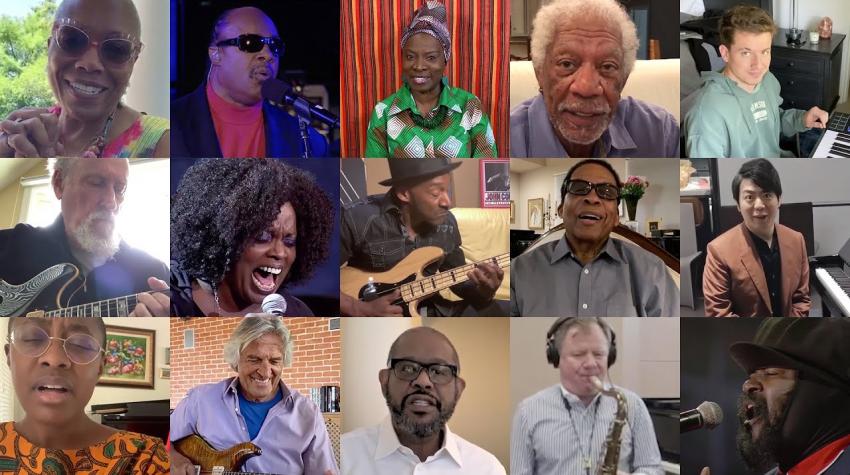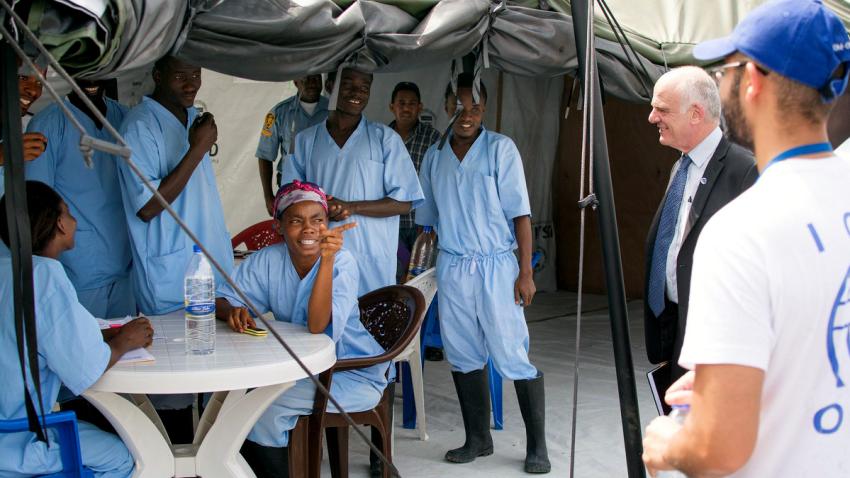“There can be no future without culture… it is through culture that we will forge our collective resilience and it is culture that will bring us closer together.” – UNESCO Assistant Director-General
6 May 2020 — When this year’s live jazz concert to celebrate International Jazz Day was cancelled due to COVID-19, musicians planning to perform at the 30 April event in Cape Town, South Africa, decided to live-stream their music from their homes.
International Jazz Day, first proclaimed by the United Nations Educational, Scientific and Cultural Organization (UNESCO) in 2011, is for “people of all ages, ethnicity, genders and beliefs to join forces to prove, without a doubt, our similarities are more powerful than our differences,” said renowned jazz pianist Herbie Hancock, as he opened the virtual concert.
Mr. Hancock, who is also the UNESCO Goodwill Ambassador for Intercultural Dialogue, described jazz as “an encouragement to courage”. Musicians around the world performed in tribute to frontline responders -- doctors, nurses, scientists and every single health care worker who have been “working tirelessly day in and day out, risking their own safety for ours.”
Legendary jazz saxophonist Wayne Shorter, who was among the performers, said “music inspires bravery and fearlessness.”
Demonstrating the power of music to inspire global solidarity, the event is among the many UN-supported cultural responses to COVID-19.
According to UNESCO, 128 countries have closed their cultural institutions. An estimated 90 per cent of the world’s 60,000 museums are facing full, partial or eventual closure. Traditional festivals and a wide array of other events also have been cancelled, impacting the cultural life of communities and the income of creative professionals, whose work is often seasonal.
Despite such challenges, artists in Africa are coming together to help defeat COVID-19 – and misinformation about the virus - through the #DontGoViral campaign launched by UNESCO, in partnership with the Innovation for Policy Foundation (i4Policy).
At the launch, Ugandan musician and member of parliament Bobi Wine announced that he is openly licensing his latest hit song “Corona Virus Alert”. He encouraged other artists to do the same and invited fellow creatives across the globe to join the campaign. A main focus is to highlight the need for access to culturally relevant and openly licensed information in local African languages as a way to raise awareness about mitigating the spread of COVID-19.
Participants of the campaign are requested to ensure that all themes and guidelines expressed conform with their official health agency and recommendations from the World Health Organization (WHO).
“The voice and influence of innovators and artists and the role of the cultural and creative industries in information and awareness-raising cannot be over-estimated,” UNESCO said. Artists can share and amplify crucial information among fans and followers, reaching an immense audience by using their talent and diverse forms of cultural expressions to engage with people in response to the crisis.
Along similar lines, the “One World: Together At Home” virtual concert on 18 April, organized by the World Health Organization and Global Citizen, raised more than $127 million to support organizations responding to COVID-19, including $55 million for WHO’s Solidarity Response Fund. The live streaming and TV broadcast, curated by Lady Gaga, featured real-life experiences of doctors, nurses and families living through the pandemic.

Countless other initiatives are underway across the world, featuring musicians, dancers, visual artists and writers who have made their works accessible online.
In times of #COVID19, how can we ensure that #CultureNeverStops?
— UNESCO (@UNESCO) April 15, 2020
Let’s travel virtually & #ShareCulture!#WeAreItaly, so why not take a dive into 700 years of culture in one place - @UffiziGalleries in Florence?
https://t.co/b2s5MFtBgw @_Mibact @ItalyMFA #WorldHeritage pic.twitter.com/36MROEEUsO
Reading Books
Much-loved children’s authors are joining “Read the World,” an initiative to read extracts of their books to millions of children and young people currently living in isolation amid the COVID-19 pandemic. It is a collaboration between the International Publishers Association (IPA), the World Health Organization (WHO) and the United Nations Children’s Fund (UNICEF).
“Children’s lives and routines have been turned upside down in just a few short weeks,” said UNICEF Executive Director Henrietta Fore. “Even when the outside world is out of bounds for now, reading can remind children and young people that the transportive power of books is unlimited.”
Museums
In Lebanon, museums have made virtual tours and mobile applications available to the public. “We will come through this and we are keeping in mind, for after COVID-19, the reprogramming of activities in our museums,” said Anne Marie Afeiche, Executive Director General for the Council of Museums. “By saving culture, we save society, its diversity, its vitality and its creativity.”

The Museum of Black Civilizations in Dakar, Senegal, has also taken quick action. Since the museum closed due to COVID-19, it has engaged its experts to film guided tours of all its exhibitions, said General Manager Hamady Bocoum. “These will be broadcast in segments on Senegalese television, and will also be made available online,” he said.
World Heritage Sites
About 90 per cent of countries have closed or partially closed their UNESCO World Heritage sites.
Ngorongoro Conservation Area, a World Heritage Site in the United Republic of Tanzania, is one of the greatest natural wonders of the planet, with its stunning Ngorongoro Crater and spectacular concentration of wildlife. While it has remained open during the pandemic, it is hosting virtual visits through web cameras, allowing people to enjoy the view remotely, said Conservation Commissioner Freddy Manongi.
Through #ShareCulture, UNESCO is inviting everyone to communicate their love of art and share it with as many people as possible. The agency’s “ResiliArt” movement, meanwhile, features a series of global virtual debates with renowned artists and professionals, and draws attention to the need to support cultural life.
The Mona Lisa is staying at home, and you?
— UNESCO (@UNESCO) April 3, 2020
To fight #COVID19, there's ONE thing we all can do: #StayAtHome.
@DavidBokeh #ShareCulture #StayHomeSaveLives pic.twitter.com/RWyjuzW3hn
In an expression of solidarity for the importance of cultural life, more than 130 Ministers and Vice-Ministers of Culture convened in an online UNESCO discussion on ways to bolster the cultural sector. While one of the first sectors to be affected by this crisis, culture is often the last to receive budgetary support.
Many participants pointed out that culture is a collective experience of shared humanity and it will be important to revitalize human contact when it is safe to do so. Some emphasized the need to support culture that “does not easily translate in the virtual world”.
Supporting Artists
Several Ministers highlighted emergency funding packages put in place in their countries to safeguard the livelihoods of artists and creative professionals in the short-term.
“There can be no future without culture,” said Ernesto Ottone Ramírez, UNESCO Assistant Director-General for Culture. “It is through culture that we will forge our collective resilience and it is culture that will bring us closer together.”




